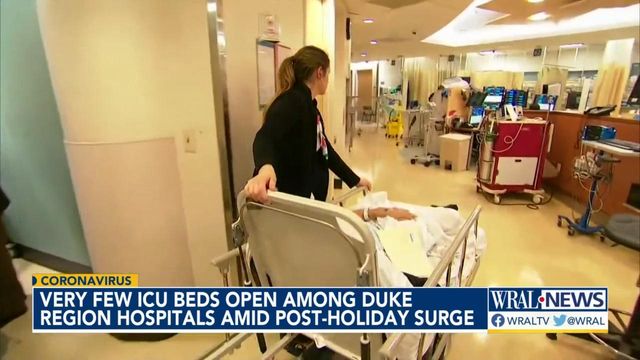NC breaks more COVID records: highest ever single-day case increase, positivity rate reported
Nearly 3 in 10 people who are getting tested for COVID-19 in North Carolina in recent days are testing positive, according to the Wednesday update from the state Department of Health and Human Services.
Posted — UpdatedThe state added 20,770 new coronavirus cases on Wednesday, the most ever added in a single day. That's more than seven times higher than the number added a month ago on Dec. 5.
The previous record was shattered on Friday, when the state added 19,174 new coronavirus cases.
"Really being up-to-date on your vaccination is making sure you get boosted," Cooper said. "When the CDC makes that decision, that they're going to include boosters in their definition of up-to-date, this executive order authorizes our state human resources department to include that as part of the requirement for state employees."
North Carolinians are taking more tests now than ever. On New Years Eve and the day before, residents took more than 180,000 tests.
Kody Kinsley, North Carolina's new Secretary of the Department of Health and Human Services, said that the state found that more than 80% of recently sequenced coronavirus cases were the coronavirus' omicron variant. Moving forward, he expects almost all new cases to be omicron.
"That is crowded out all the other variants. It's safe to assume as we move forward that pretty much every positive we are seeing is omicron," Kinsley said.
North Carolina's seven-day rolling average in new cases has once again hit an all-time high at 14,757. On Monday, that number was 13,830.
"Treatment is extremely limited across the country," Kinsley said. "Because supply is limited, per federal guidance, treatments will be used for those at highest risk for severe disease."
Kinsley said that the best way to treat COVID-19 is through prevention and encouraged the public to get vaccinated and boosted.
North Carolina has seen a slight increase in its vaccination rate. As of Wednesday, 70% of all adults in North Carolina are fully vaccinated and 63% of all residents age five and up have got their shots.
Duke University Hospital's ICU is at capacity, chief medical officer says
At this time 3,099 people are hospitalized with the virus and 634 COVID-19 patients are in the ICU — a 36% increase compared to last week.
481 people were admitted into state hospitals on Tuesday, which is the third highest single-day increase ever. That's more than any day during the state's delta surge and just behind two dates in early January 2021.
Only 12 ICU beds, or 8% of all beds, are open in the Triangle, according to DHHS. Across the state, about 15% of all ICU beds are open and staffed. Most of those people are unvaccinated, Cooper said.
Only eight ICU beds are left open at all Duke hospitals across North Carolina and Duke University Hospital's ICU has reached capacity, according to Dr. Lisa Pickett, chief medical officer at Duke Health.
"Right now just over 10% of the patients in our hospital are there with COVID," she said. "Throughout the system, that’s about well over double what we were about 10 days ago."
About 16 people are waiting on an ICU bed on any given day, she said, and the hospitals are considering moving patients to tents outside.
"We are now looking at plans where we may have to divert some of our COVID patients into those tents," she said. "We have not yet done that."
Part of that has to do with the number of staff members out of work due to COVID-19, Pickett said.
Around 700 Duke Health employees, or around 3% of all Duke full-time employee were, out of work on Tuesday due to COVID-19. That's a stark increase from Dec. 30, when 400 employees were out.
"Even if we could open all of the bed, that we would like to, it’s because we simply don’t have enough healthy staff to do that," she said.
Pickett said Duke Health has already started to pause elective procedures and worries about delaying care to people in need.
While North Carolina's case counts skyrocket, the number of people hospitalized with COVID-19 remains relatively low when compared to both the surge in hospitalizations last winter and fall. As of now, the average number of hospitalizations is 36% lower than at our peak on Jan. 16, 2021, but that number could increase in the next few weeks.
"We are concerned both for patient care and for staffing," Kinsley said.
90% of patients hospitalized in Duke Health's ICU units are unvaccinated, Pickett said. Every patient in the Duke Health system on the highest level of life support is unvaccinated, she said.
UNC Health reported more than 650 employees, or around 1% of all employees, were absent on Tuesday due to a COVID-19 exposure or a positive COVID-19 test.
Even with hundreds of staff members out, only nine hospitals reported to the state that they were experiencing a "critical staffing shortage." The state Department of Health and Human Services does not disclose which nine hospitals are experiencing a staff shortage.
Who is testing positive for COVID-19 right now?
From the week of Dec. 26 to Jan. 1, nearly 91,000 new coronavirus cases were reported. State data shows during that time, Black people were disproportionally testing positive for COVID-19.
That week 32% of all cases were among Black North Carolinians, even though they make up around 22% of the population. This indicates that there has been an increase in cases among the state's Black population during the latest COVID-19 surge. Throughout the course of the pandemic, Black people have had around 22% of all the state's coronavirus cases, which is proportional.
White North Carolinians made up around 49% of all coronavirus cases last week, even though they make up 60% of all coronavirus cases. About 71% of North Carolina residents are white, according to data from the state Department of Health and Human Services.
The state data does not provide race or ethnicity data on when it comes to testing, so it is unclear if one demographic group is taking more tests than the other.
16% of all coronavirus cases reported last week were in children under 16, while the state's elderly population only made up 8% of all tests.
10% of all state cases were in babies younger than one years old last week, according to the state.
Schools set to begin as cases climb
Young adults ages 18 to 24 have the highest number of new cases per population, state data shows. Across North Carolina there are 1,302 cases per 100,000 residents in that age group.
The number of children with the virus is also on the incline. More than 55 of those hospitalized with COVID-19 are children, according to the state. Five of those children were admitted since Tuesday.
Cooper said the state would not be recommending that schools close even as cases continue to tick upward.
"The new omicron variant has been less severe than the previous surges," Cooper said. "We have the benefit of so much more information, science and data than we did at the start of this pandemic. We are using that knowledge to keep students safely in the classroom, help businesses stay open and ensure public services are running."
The North Carolina Department of Health and Human Services released new guidance on Thursday that said vaccinated students, who wore a mask, did not need to quarantine if exposed to COVID-19. The intention of this new guidance is to help keep kids in the classroom, according to DHHS.
To help slow the spread of coronavirus, Kinsley said that the state would be providing N-95 masks to long-term care facilities, hospitals, schools and migrant farmers.
Related Topics
• Credits
Copyright 2024 by Capitol Broadcasting Company. All rights reserved. This material may not be published, broadcast, rewritten or redistributed.






